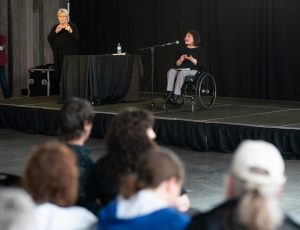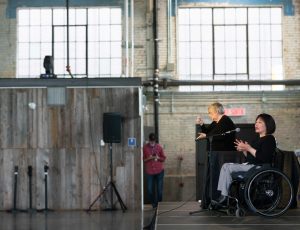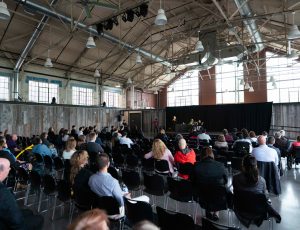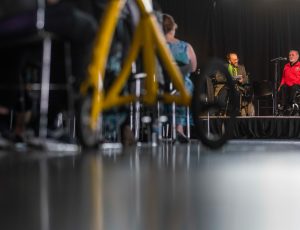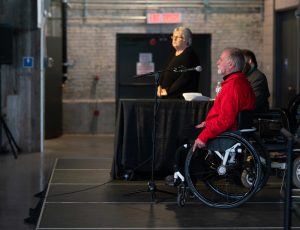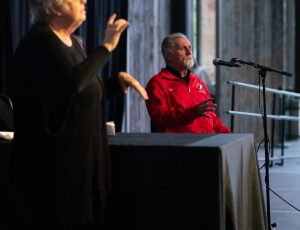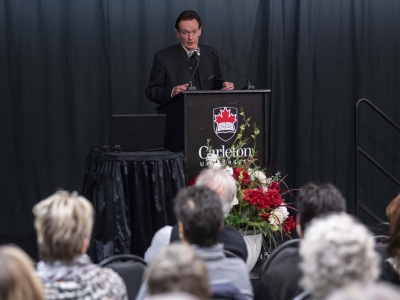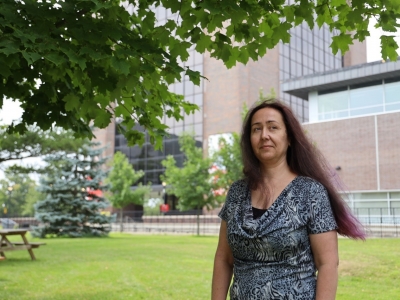By Joseph Mathieu
Photos by Chris Roussakis
A common experience for many people with disabilities is to be excluded from some everyday aspects of life because of false assumptions.
Accessible Potential, an event on May 28, 2019 directly challenged those misconceptions.
The event was held during this year’s National AccessAbility Week (NAAW), which ran from May 27 to June 1. The campaign to promote inclusion and accessibility across the country also aims to celebrate Canadians who live and thrive with disabilities.
Entrepreneur and comedian Michael Lifshitz was master of ceremonies for the evening. A chartered professional accountant with an MBA, Lifshitz pointed out how his multiple congenital musculoskeletal abnormalities did not prevent him from starting, owning and selling several successful businesses.
Breaking Ground for People with Disabilities
He presented speakers whose lives prove that people with disabilities can be professional athletes, award-winning musicians or groundbreaking researchers in any field.
One was former Canadian Paralympian Dean Mellway, special adviser to Carleton University’s Research, Education, Accessibility and Design (READ) Initiative. Mellway won gold for Canada in men’s singles snooker in 1976, and bronze in sledge hockey in 1994 and 1998.
“What led my life is how my family treated my disability,” said Mellway. “‘No special treatment for that guy, he can do it as good as anybody.'”
As a toddler, Mellway survived the last epidemic of polio in eastern Canada. He grew up loving sports, but wasn’t allowed to participate in physical education in school due to his mobility issues.
Excluded from athletics all his young life, it was only when he attended Wilfrid Laurier University in Waterloo, Ont., that he began to play wheelchair sports. As he completed a master’s in social work, he became involved in wheelchair sports. He became executive director of the Canadian Wheelchair Sports Association in 1980.
In 1990, he joined Carleton’s new Paul Menton Centre for Students with Disabilities (PMC), and served in various roles across campus over the years. He was acting director of the READ Initiative for six years.
Carleton has been a leader in accessibility for decades. When the PMC first opened, only about 100 applied for its services. Today it has 3,400 students registered and grows at a rate of some 300 a year.
“When I first went to university in the late ’80s, there wasn’t such a thing as disability services,” said Somei Tam, a senior disability adviser at the PMC who was also affected by polio as a child.
Even during the United Nations Decade of Disabled Persons, from 1983 to 1992, she said it was not common for disabled people to go to university. Tam, who grew up in China, completed a Bachelor of Fine Arts at Queen’s University and a Bachelor and Master’s in Education at the University of Ottawa.
Work Still to be Done in Professional World
Attitudes on campuses have greatly improved across Canada and the United States, but not so much in the working world, she said. Universities and colleges need to develop and nurture ways in which students with disabilities can go on to thrive in the workplace.
The PMC and Carleton’s Career Services recently launched the Accessible Experiential Learning Project with help from Ontario’s Career Ready Fund to give students useful work experience before starting careers.
“People with disabilities have the same potential and aspirations as anyone,” said Tam.
The varied life experiences of the event’s speakers were linked by their successes, in part due to supportive and loving families, resilience and humour in the face of adversity, and an acceptance and pride in their abilities.
“It’s okay to have a disability, in fact it’s good,” said Phillip Turcotte, a lawyer with the Canadian Human Rights Commission. “Disability is just part of the human experience.”
Despite his cerebral palsy and learning disabilities, Turcotte graduated with highest honours from Carleton and works on issues of social justice and conflict resolution.
Though the first speaker was born premature with underdeveloped eyes, Lucas Haneman never let that define him.
“When I think about my life, I don’t think about visual impairment,” he said. “Rather, I think guitars and music, and in more recent years my lovely and talented wife and now my year-and-a-half-old baby girl.”
Haneman started playing the six-string when he was six years old. Exploring the genres of blues, punk, jazz, reggae and rock, as a boy he pictured himself all grown up playing guitar at Austin City Limits. Last year, his Lucas Haneman Express was nominated for Best New Act at the 2018 Maple Blues Awards, and this April they released their third full-length album Catch the Westbound.
“I do not think of myself as someone with a disability but as a musician,” said Haneman. “Don’t let your disability define you, let your talent or your uniqueness define you.”
Wednesday, June 5, 2019 in Accessibility
Share: Twitter, Facebook
